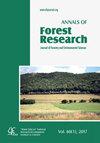基于邻居的证据表明山毛榉在古老的落叶针叶混交林中促进了树木多样性(喀尔巴阡山脉东部)
IF 1.7
3区 农林科学
Q2 FORESTRY
引用次数: 0
摘要
邻里关系模型是了解积极和消极相互作用在维持混合林树种多样性方面的作用的有用工具。在这样的假设下,我们旨在检验几个关于古老的山毛榉-冷杉-云杉林中自生物种共存机制的假设,该林是Slătioara森林保护区(喀尔巴阡山脉东部)的一部分。单变量/双变量空间点模式分析、单株-树种-面积关系、物种混合分析和邻居干扰的广义线性混合模型应用于0.24公顷地块内所有树苗和树木的位置和异速测量数据。山毛榉或云杉幼树的单特异性分布不支持空间分离假说。没有证据表明存在同种负距离依赖性,因为在任何物种的树苗和树木之间都没有检测到空间分离。在4米的邻域内,山毛榉树苗表现为多样性积累者,这可能表明间接促进作用(例如,群体保护假说)。在树木阶段,就幼树物种丰富度而言,这三个物种都没有在其附近表现出蓄积或排斥模式。在树大小的山毛榉(10至20米)和云杉(4至17米)中分别发现了阳性和阴性种间关联的信号。前一种高度分散的模式符合正互补效应的假设,而后一种混合不良的模式可能与云杉树对其同种树苗的茎生长产生的意想不到的正相邻效应有关。这种自私自利的过程可能是由于一种有助于促进的地下机制。相反,山毛榉树苗受到邻近同种树木的干扰而受到抑制。山毛榉似乎是研究林分中树种共存的关键推动者,与之形成鲜明对比的是,过度森林中云杉的低分布导致当地树木多样性降低。本文章由计算机程序翻译,如有差异,请以英文原文为准。
Neighbourhood-based evidence of tree diversity promotion by beech in an old-growth deciduous-coniferous mixed forest (Eastern Carpathians)
Neighbourhood models are useful tools for understanding the role of positive and negative interactions in maintaining the tree species diversity in mixed forests. Under such a presumption, we aimed at testing several hypotheses concerning the mechanisms of autogenic species coexistence in an old-growth, beech-fir-spruce stand, which is part of the Slătioara forest reserve (eastern Carpathians). Univariate/bivariate spatial point pattern analyses, the individual tree species-area relationship, the species mingling analysis and generalised linear mixed models of neighbour interference were applied on data concerning the position and allometry of all saplings and trees occurring within a 0.24 ha plot. The monospecific distribution of either beech or spruce saplings did not support the spatial segregation hypothesis. There was no evidence of conspecific negative distance dependence, as no spatial segregation was detected between the saplings and trees of any species. Within 4 m-neighbourhood, the beech saplings appeared as diversity accumulators, which might be indicative of indirect facilitation (e.g., herd protection hypothesis). At tree stage, none of the three species showed either accumulator or repeller patterns in their neighbourhood with respect to sapling species richness. Signals of positive and negative interspecific association were found in tree-sized beech (at scales of 10 to 20 m) and spruce (at scales of 4 to 17 m), respectively. The former, highly interspersed pattern is in accordance with the hypothesis of positive complementary effects, whereas the latter, poorly intermingled pattern is probably linked to the unexpected, positive neighbouring effect of spruce trees on the stem growth of their conspecific saplings. Such self-favouring process might be due to a facilitative below-ground mechanism. Conversely, the beech saplings were suppressed through interference from the neighbouring conspecific trees. The beech appears to be the key promoter of tree species coexistence in the study forest stand, in contrast to the low interspersion of spruce in the overstorey leading to lower local tree diversity.
求助全文
通过发布文献求助,成功后即可免费获取论文全文。
去求助
来源期刊

Annals of Forest Research
FORESTRY-
CiteScore
2.20
自引率
11.10%
发文量
11
审稿时长
12 weeks
期刊介绍:
Annals of Forest Research is a semestrial open access journal, which publishes research articles, research notes and critical review papers, exclusively in English, on topics dealing with forestry and environmental sciences. The journal promotes high scientific level articles, by following international editorial conventions and by applying a peer-review selection process.
 求助内容:
求助内容: 应助结果提醒方式:
应助结果提醒方式:


